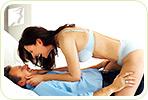
Loss of libido and depression are often linked, and there is frequent debate concerning which causes the other. For some menopausal women, loss of libido is a result of depression. When their depression is relieved, their sexual desire will eventually return.
However, for other women depression occurs due to a loss of libido and its resulting consequences, such as a damaged relationship. Nevertheless, regardless of whether the loss of libido or depression comes first, women should try to treat both conditions safely and naturally.
What Is Loss of Libido?
Loss of libido is the loss of sexual desire. When women suffer from loss of libido, they often show a decreased interest in sex, and this can have an adverse effect on their romantic relationships.
What Is Depression?
Depression describes an intense and long-lasting sadness that can influence one's ability to carry on with daily activities. Depressed women will often be disinterested in things they previously enjoyed, have a lack of appetite, or experience sleep disorders.
What Causes Loss of Libido and Depression?
Loss of libido and depression are often caused by changing hormone levels. When a woman experiences menopause her estrogen and progesterone levels become imbalanced. The body can have difficulty coping and sexual desires can disappear. The consequences of a loss of libido, such as relationship problems, can cause depression.

Loss of libido and depression can also be caused or worsened by the medication that some women take to manage depression. Certain medications can cause women to lose their sexual desire completely, and some can prevent women from having orgasms.
How Can Loss of Libido and Depression Be Treated?
There are different ways to treat loss of libido and depression, and women should talk to their doctors to discuss the different treatment options.
Counseling
Visiting a counselor often helps a woman to reverse her loss of libido and depression by discussing what the root causes may be. Often, when you better understand the reasons for loss of libido and depression, you can fight them both more effectively.
Cognitive Behavioral Therapy

Cognitive behavioral therapy helps women to reduce depressing thoughts, which can also help them to overcome loss of libido.
Group Therapy
Group therapy is widely available to women, and it provides a place to openly discuss loss of libido and depression. Although these groups usually target depression specifically, dealing directly with this problem may lead to an improvement in libido as well.
Natural Supplements
Many women find that natural supplements can help boost hormone levels, reverse their loss of libido, and help treat depression. Phytoestrogenic and hormone-regulating herbs can increase estrogen levels and combat all of the symptoms of menopause.
Medication
If a woman finds her loss of libido and depression are not being helped by any of the methods above, she should discuss the possibility of pharmaceutical treatments with her doctor. The effects of loss of libido and depression can be traumatic and damaging to a woman's relationships. There are prescription-only medications that may help to treat the root cases of loss of libido and depression.
More Information
The safest way to treat loss of libido and depression is to start with lifestyle choices, counseling, and herbal supplements before trying prescription medication. Follow the links below to learn more about loss of libido and depression treatment options.
Sources
- Channon L.D and Ballinger S.E. "Some Aspects of Sexuality and Vaginal Symptoms during Menopause and their Relation to Anxiety and Depression". British Journal of Medical Psychology. June 1986. 59 (2): 173-80.
- Sarell, Philip, M.D. "Psychosexual effects of menopause: Role of androgens". American Journal of Obstetrics & Gynecology. March 1999. 180: 3S-II.
- Studd, John. "Loss of Libido and Menopause". The Management of Menopause. Annual Review 1998. Partenon Publishing.


